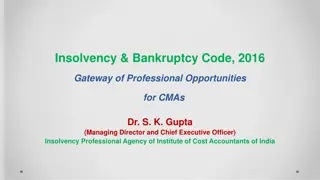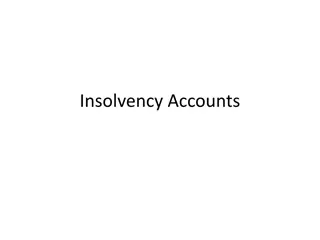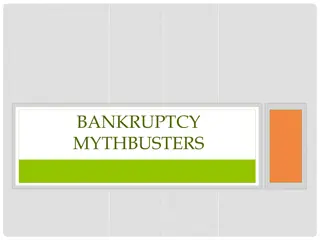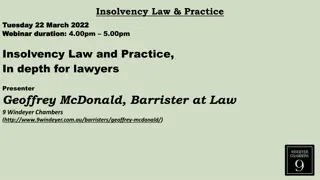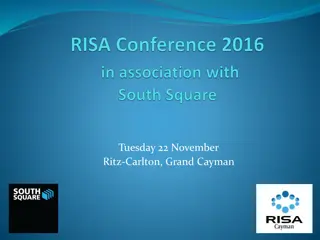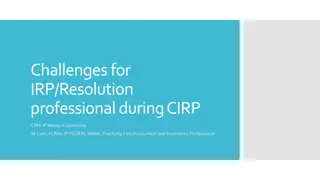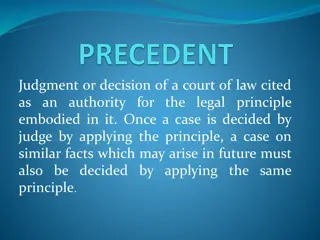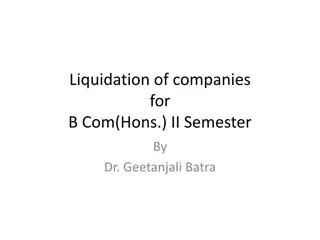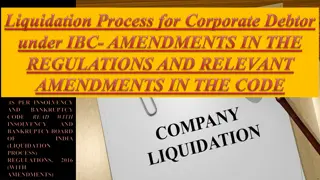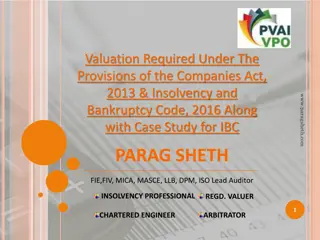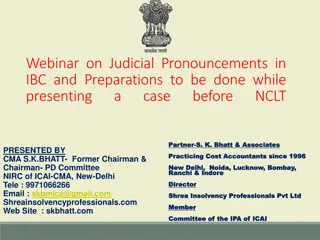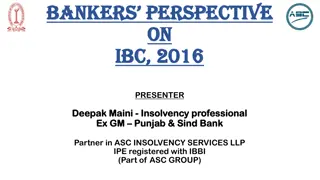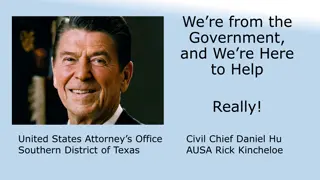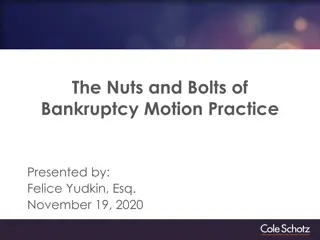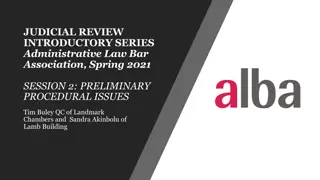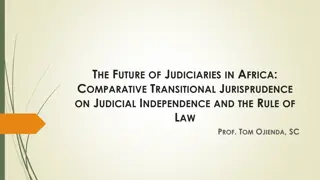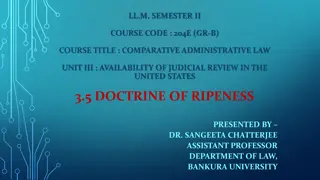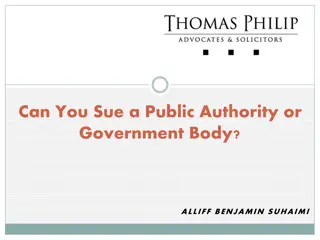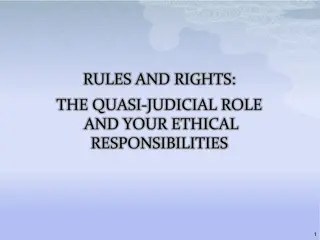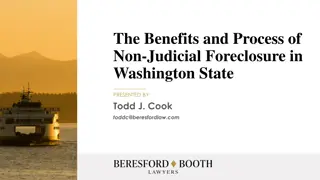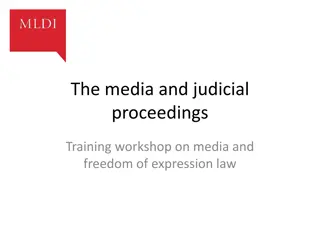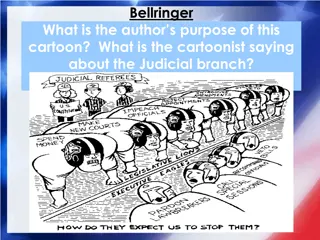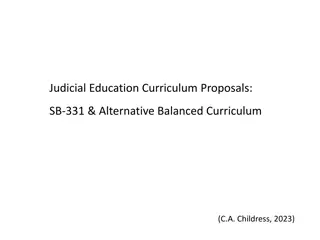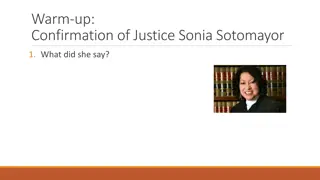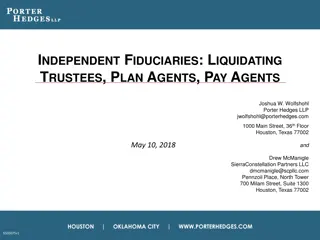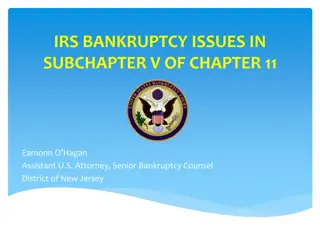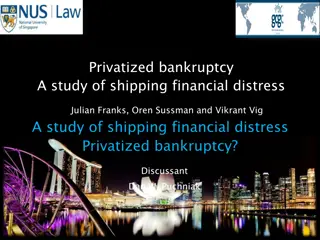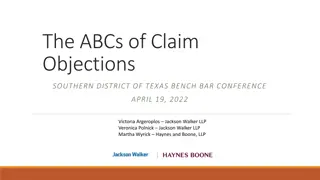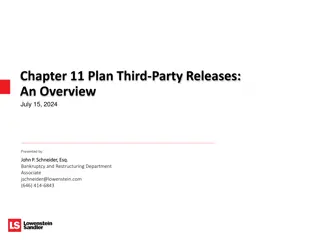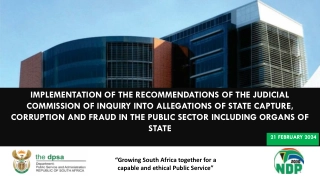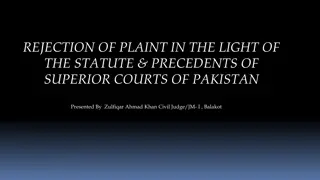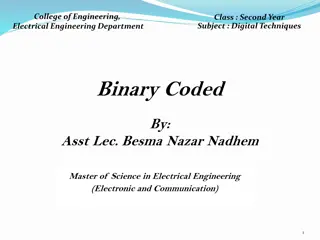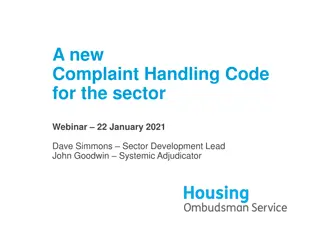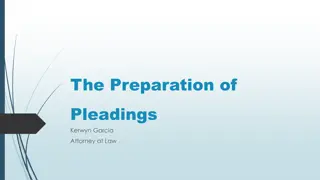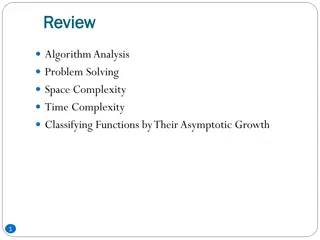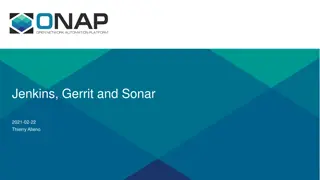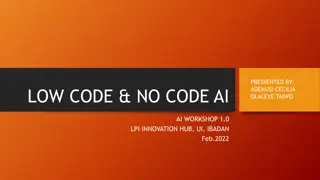Key Judicial Precedents on Insolvency and Bankruptcy Code, 2016
Key judicial precedents under the Insolvency and Bankruptcy Code, 2016 are discussed, including rulings on insolvency pleas, distribution of profits during Corporate Insolvency Resolution Process (CIRP), obligations of unrelated parties, the 90-day period for filing claims, and the interaction of moratorium with DRAT powers. The interplay between the IBC and SEBI Act is also explored through a case challenging an NCLT order.
Download Presentation

Please find below an Image/Link to download the presentation.
The content on the website is provided AS IS for your information and personal use only. It may not be sold, licensed, or shared on other websites without obtaining consent from the author. Download presentation by click this link. If you encounter any issues during the download, it is possible that the publisher has removed the file from their server.
E N D
Presentation Transcript
Significant Issues vis--vis Judicial Precedents under Insolvency and Bankruptcy Code, 2016 By: CA. Kamal Garg [B. Com (H), FCA, DISA (ICAI)] [Insolvency Professional]
Sec 9 insolvency plea can't be rejected when disputed claim is not raised prior to demand notice - Ahluwalia Contracts (India) Limited, Re (NCLAT) NCLT empowered to pass ad-interim orders including an order restraining the Corporate Debtor from alienating, encumbering or creating any third party interest admitting Insolvency Application - NUI Pulp and Paper Industries Pvt Ltd, Re (NCLAT) CoC has no power to in Resolution Plan. The distribution of amount to the financial creditors, operational creditors and other stakeholders ought to be made by the Resolution Applicant. The role of the Committee of Creditors is thus limited to ascertaining the commercial feasibility and viability of the Resolution Plan Essar Steel Limited, Re (NCLAT) on its assets, before distribute money promised
Any amount of profit generated during the CIRP cannot be given to a successful Resolution Applicant as the successful Resolution Applicant has not invested any money during the CIRP. The profits should be distributed amongst all the creditors including the financial creditors and the operational creditors on pro rata basis Essar Steel Limited, Re (NCLAT) Unrelated parties under no obligation to furnish information under Section 19 of Insolvency Code. However, there is an obligation on the ex-personnel of the corporate debtor, its promoter or any other person associated with the ex-management including ex-directors to extend all assistance and cooperation to the Interim Resolution Professional to enable him to manage the affairs of the corporate debtor Educomp Infrastructure & School Management Ltd., Re (NCLT)
90-Day Period for Filing Claim with Resolution Professional is directory. Regulation 12(2) of the CIRP Regulations provides that a creditor, who fails to submit claim with proof within the time stipulated in the public announcement, may submit the claim with proof to the IRP or the RP, as the case may be, on or before the 90thday of the insolvency commencement date - Twenty-First Century Wire Roads Ltd., Re (NCLT Delhi), Edelweiss Asset Reconstruction Co. Pvt. Ltd. v. Adel Landmarks Ltd. (NCLT Delhi), State Bank of India v.ARGLLtd. (NCLT Delhi) Moratorium under IBC does not make DRAT powerless to recall appointment of Court Commissioner. The Court held that after the imposition of the moratorium, the DRAT was not powerless to modify its own order which appointed the two court commissioners to take over control of the assets of the petitioner/corporate debtor - Amira Pure Foods Pvt Ltd., Re (Delhi HC)
Will IBC override SEBI Act? NCLT order challenged by SEBI in Supreme Court SEBI vs. Rohit Sehgal & Ors. (SC) SEBI had, in 2015, directed attachment of properties belonging to one HBN Dairies and Allies Ltd on account of illegally collecting monies worth Rs. 1,136 Crores under an unauthorized CIS. Later a group of over 30 depositors filed an application against HBN Dairies before the NCLT under the IBC. NCLT ordered CIRP and made the appointment of an IRP. The order also directed de-attachment of the properties that were attached by the SEBI. NCLT and later NCLAT held that the IBC will override the SEBIAct Grounds: a) CIS is constituted in the form of a Trust and its assets are held by the Trustees for the benefit of the investors. b) IBC can t be invoked as the case concerns a CIS and not a Co. This Trust is completely divorced from the Collective Investment Management Company which initiates the scheme. c) The unit purchasers, that is the depositors in the scheme, are not lenders but holders of units which would become tradeable commodity once the trust is registered.
'Undischarged Insolvent' under the 29A - NCLT not the right forum to determine. In terms of Sec. 29A(a) and (j) any (connected) person who is 'undischarged insolvent', cannot be a resolution applicant. It was argued that since Tayo Rolls, a subsidiary of Tata Steel was under CIRP, Tata Steel is 'undischarged insolvent'. Can a company under CIRP be called 'undischarged insolvent'? The NCLT noted that Section 7 and Section 9 proceedings are summary proceedings for the determination of default, which are not conclusive. The NCLT further noted that CIRP is a rescue process and while a company is under CIRP, it cannot be said to be 'undischarged insolvent . The determination of who is 'undischarged insolvent' has been vested with a court of competent jurisdiction, which it isn't under the IBC SBI vs. Bhushan Energy Ltd. (NCLT Delhi)
Moratorium inapplicable to third party goods with corporate debtor. While Section 14(1)(d) of the IBC prohibits recovery of any property by the owner, in possession of the corporate debtor, it does not state what such property comprises of. Section 3(27) mentions that property will include - money, goods, land, actionable claim, etc. On the other hand, Section 18 of the IBC requires the resolution professional to take control and custody over the assets of the corporate debtor. For the purposes of Section 18 only, however, assets owned by third parties in possession of the corporate debtor are not included. Section 18 carves out a particular exception for two kinds of assets: (i) a trust asset or (ii) an asset in possession owing to a contractual arrangement. This implies that the resolution professional is not required to take 'control and custody' over assets in possession of the corporate debtor, which belong to third parties Company Application by Sun Pharmaceutical Industries in the matter of Parabolic Drugs Ltd. Vs. Weather Makers (P) Ltd. (NCLT- Chd.)
Trade Unions can file as operational creditors under IBC. The trade union had issued a demand notice to the corporate debtor, Juggilal Kamlapat Jute Mills, on behalf of 3000 workers and filed an application at the NCLT which was rejected by it and later by NCLAT as well. Since a trade union is certainly an entity established under a statute namely, the Trade Unions Act, and would therefore fall within the definition of person under Sections 3(23) of the Code. This being so, it is clear that an operational debt , meaning a claim in respect of employment, could certainly be made by a person duly authorised to make such claim on behalf of a workman- JK Jute Mill Mazdoor Morcha vs Juggilal Kamlapat Jute Mills Co. Ltd. (SC)
Homebuyers' Act maintainable during Insolvency proceedings - Jaiprakash Associates Limited, Re (SC) Demand of interest without a contractual clause. Whether interest on such delayed payments under invoices constitutes a debt contract need not necessarily be in writing and its terms can arise out of mutual understanding debt to be demonstrated through an invoice - Reg. 7 of CIRP acceptance of goods/services pursuant to an invoice without demur, and despite invoices not signed by both parties, would make the suit maintainable as a summary suit as the invoices must be treated as a written contract - for Order 37 CPC, the Bombay High Court in Jatin Koticha v. VFC Industries Pvt. Ltd. and the Madras High Court in Olive Tree Trading Pvt. Ltd. v. F.lli De Cecco Di Filipro FAra S. Martino SPA. In M/s Wanbury Ltd. v. M/s Panacea Biotech Ltd., the NCLT (Chandigarh) found the interest mentioned in the invoices to be a unilateral act of the applicant and rejected the claim of interest. complaints under Consumer Protection
Monies from a corporate debtors account cannot be appropriated by a financial creditor once Corporate Insolvency Resolution Process (CIRP) is initiated - State bank of India vs. Debashish Nanda (NCLAT) Challenge to the Constitutional Validity of the Insolvency and Bankruptcy Code, 2016 - The Supreme Court in Swiss Ribbons Pvt. Ltd. v. Union of India and Ors. rejected the multi-pronged challenge to the constitutional validity of the Insolvency and Bankruptcy Code, 2016. Time taken to appoint Resolution Professional to be excluded from CIRP - Say India Jeweller Pvt. Ltd, Re (NCLT Mum.) Commercial wisdom of the CoC has been given paramount status without any judicial intervention. There is an intrinsic assumption that financial creditors are fully informed about the viability of the corporate debtor and feasibility of the proposed resolution plan. Upon receipt of a rejected resolution plan the NCLT is not expected to do anything more; but is obligated to initiate liquidation process under Section 33 K Sashidhar vs. Indian Overseas Bank & Ors. (SC) w.r.t. the liquidation order for Kamineni Steel & Power India Ltd.
Provisions of the Limitation Act, 1963 are applicable to applications filed by financial and operational creditors Section 238A of IBC - Supreme Court in BK Educational Services Private Limited v. Parag Gupta and Associates - The issue that arose before the Supreme Court was whether the Limitation Act is applicable to applications that are made under Section 7 and/or Section 9 of the Code from its commencement on December 1, 2016 till June 6, 2018 i.e. the date on which theAmendmentAct came into force. (1) The right to sue under Section 7 and 9 of the Code accrues when a default occurs; (2) Save and except those cases where Section 5 of the Limitation Act is applicable, If the default has occurred over three years prior to the date of filing of the application, the application would be barred underArticle 137 of the LimitationAct . Poser: Article 113 vs. Article 137 Right to Sue vs. Right to Apply
Insolvency Resolution Plan should be shared with erstwhile Board of Directors of Corporate Debtor - Vijay Kumar Jain of Ruchi Soya Industries Limited vs. Standard Chartered Bank 7 Ors. (SC) NCLT cannot get into "disputed question of fact . In the present case, the cause of action had arisen when the Debtor company had refused to return the loan. However, in the Civil proceedings the cause of action is in operation when the litigating parties file a suit of divorce. Both the legal proceedings are independent having no nexus with each other, therefore, can be independently adjudicated by two different judicial forum - Vijay Rochlani vs. Shanti Exim Ltd (NCLT Mum.) Supreme Court allows withdrawal of case after 'Expression of Interest despite Regulation 30A which allows withdrawal only before an invitation for EOI has been issued. Section 12A provides that the NCLT may allow withdrawal of a case that has entered into CIRP, if 90% of the creditors have voted for it. This stipulation under Reg. 30A can only be construed as directory depending on the facts of each case - Brilliant Alloys Private Limited, Re (SC)
IBC cannot be invoked in respect of an operational debt where an arbitral award has been passed against the operational debtor, which has not yet been finally adjudicated upon K. Kishan vs. M/s Vijay Nirman Company Pvt. Ltd (SC) Erstwhile directors of a company cannot maintain an appeal on behalf of the company after an insolvency professional has been appointed to manage the company Innoventive Industries Ltd. v. ICICI Bank &Anr. (SC) Sction 14 of the insolvency and bankruptcy code, 2016, which provides for a moratorium for the limited period mentioned in the code, on admission of an insolvency petition, would not apply to a personal guarantor of a corporate debtor - State Bank of India vs. V. Ramakrishnan (SC) Arbitration proceedings cannot be initiated after moratorium has been imposed - Alchemist Asset Reconstruction Company Limited v. M/s Hotel Gaudavan Private Limited & Ors. (SC)
Whether the time limit prescribed in the IBC for admitting or rejecting a petition or initiating a petition is a mandatory or directory process - Surendra Trading Company v. Juggilal Kamlapat Jute Mills Company Limited and Others (SC): Such time limit is a tool of aid in expeditious dispensation of justice and is directory; Provision of removing the defects in an application within seven days is directory and not mandatory in nature; Applicant while refilling the application after removing the objections, file an application in writing showing sufficient case as to why the applicant could not remove the objections within seven days Whether the adjudicating authority can engage another resolution professional or liquidator in place of the existing resolution professional or liquidator if performance of such resolution professional or liquidator is not satisfactory Yes Sandeep Kumar Gupta Resolution Professional v. Stewarts & Lloyds of India Ltd. & Anr. (NCLAT)
Order of moratorium will not cover a criminal proceeding under section 138 of the Negotiable instruments Act No Shah Bros Ispat Pvt. Ltd v. P. Mohanraj & Ors. (NCLAT) Compliance with section 9(3)(c) of the IBC regarding copy of the certificate from the financial institutions etc. is not mandatory in nature - The requisite elements are occurrence of a default and delivery of a demand notice of an unpaid operational debt or invoice demanding payment of the amount involved - Macquaire Bank Limited v. Shilpi Cable Technology (SC) Section 29A(c) of the Insolvency and Bankruptcy Code, 2016, has observed the stage of ineligibility attaches when the resolution plan is submitted by a resolution applicant and not at any anterior stage. Further, the time limit for completion of the insolvency resolution process as laid down u/s 12 is mandatory and it cannot be extended beyond 270 days - Arcelormittal India Pvt. Ltd. v. Satish Kumar Gupta & Ors. (SC) The period of CIRP should be extended in the interest of the stakeholders/ home buyers - Chitra Sharma & Ors. v. UOI (SC)
The Hon'ble Supreme Court upheld Section 238 IBC, 2016. Further it was held that the Code will override anything inconsistent contained in any other enactment, including the Income-tax Act. Further the court held that Income-tax dues, being in the nature of Crown debts, do not take precedence even over secured creditors, who are private persons - Pr. Commissioner of Income Tax v. Monnet Ispat and Energy Ltd. (SC) The NCLAT held that statutory dues of income tax, value added tax etc. are 'operational debts' under the Insolvency and Bankruptcy Code 2016. Consequently, it held that Income Tax Department, Sales Tax Department of states etc., who are entitled to such dues, are 'operational creditors - Pr. Director General of Income Tax (Admn. & TPS) Vs. M/s. Synergies DoorayAutomotive Ltd. &Ors. (NCLAT) Where the High Court has already admitted the winding up proceedings and ordered for winding-up of the Respondent Corporate Debtor, it was held that the question of initiation of CIRP against same Corporate Debtor does not arise - Innoventive Industries Limited vs. Kumar Motors Pvt. Ltd. (NCLAT); RajitMehra v. Punjab National Bank &Anr. (NCLAT)
Non issuance of notice to the corporate debtor by the AA before admission of the application u/s 7 was in violation of rules of natural justice - Chand Khan [Managing Director of CK Infrastructure Ltd.] v. RCI Industries & Technology Ltd. (NCLAT) Prevention of Money Laundering Act is a statute which came into effect much prior to coming into force of IB&C, hence, IB&C has overriding effect over PMLA - Siddhi Vinayak Logistic Ltd. v. Deputy Director, Directorate of Enforcement, Mumbai (PMLAT-AT) Where properties of corporate debtor under liquidation were attached under PMLA, question as to whether properties attached were not proceeds of crime or lenders were bona fide lenders, was to be decided by authorities under PMLA; for withdrawal of attachment, liquidator appointed under IBC has to approach authorities under PMLA - Anil Goel, Liquidator, Rotomac Global (P.) Ltd. vs. Directorate of Enforcement (NCLAT)
Where RP informed ED about moratorium in case of corporate debtor, its properties could not be attached under provisions of PMLA during such moratorium - SREI Infrastructure Finance Ltd. v. Sterling SEZ & Infrastructure Finance Ltd. (NCLT Mum.) Income-tax department cannot claim any priority in payment from liquidation estate merely because it had issued attachment order much prior to initiation of liquidation proceedings under Code. The Income-tax Department does not enjoy the status of a secured creditor, on par with a secured creditor covered by a mortgage or other security interest, who can avail the provisions of section 52. At best, it can only claim a charge under the attachment order, in terms of section 281 of the Act of 1961 - Leo Edibles & Fats Ltd. v. Tax Recovery officer (Central), Hyderabad (HC ofAP&T) Where corporate debtor consumed electricity which could be termed as a direct input to output produced by corporate debtor in providing medical diagnostic services, electricity supplied by Respondent in instant case could not be considered as essential service - Sundaresh Bhat v. Chhattisgarh State Power Distribution Company Ltd. (NCLT- Mum.)
AA admitted petition preferred by corporate debtor to initiate insolvency process against itself u/s 10 and appointed IRP. IRP submitted that the electricity company used to supply electricity to it, disconnected electricity supply to corporate debtor after passing of moratorium against corporate debtor. In instant case 'electricity' was an essential goods with reference therefore, electricity company was not entitled to disconnect power supply to corporate debtor during moratorium period - Nitin Hasmukhlal Parikh v. Madhya Gujarat Vij Company Ltd. (NCLTAhd.) Appellant submitted that there was an existence of dispute in view of fact that respondent had instituted cases under section 138 of Negotiable Instruments Act, 1881, which were pending. It was held that pendency of case under section 138 of Negotiable Instruments Act, 1881, even if accepted as recovery proceeding, could not be held to be a dispute pending before a Court of law. Such pendency of case under section 138 of 1881 Act actually amounted to admission of debt and not an existence of dispute - Sudhi Sachdev v. Appl Industries Ltd. (NCLAT) to corporate debtor,
In absence of evidence to prove any pre-existing dispute, no credence could be given to dispute raised by corporate debtor that there existed mismatch in reconciliation in loan under ICD; CIRP application was to be admitted - SEW Infrastructure Ltd. v. Amrit Jal Ventures (P.) Ltd. (NCLT- Hyd.) Where in latest Annual Report of corporate debtor, there was acknowledgement of debt liability, a fresh period of limitation would be computed from date of such acknowledgement. Since corporate debtor had from time to time, acknowledged debt after occurrence of default and even in Annual Report of corporate debtor for year 2017, said debt liability was shown, a fresh period of limitation would be computed from date of acknowledgement of debt liability in corporate debtor's annual report, and issue of limitation period would not survive in instant CIRP application - IDBI Bank Ltd. v. Jeypore Sugar Company Ltd. (NCLT Chennai)
Thank You CA. Kamal Garg [B. Com (H), FCA, DISA (ICAI)] [Insolvency Professional] cakamalgarg@gmail.com, 9811054015


